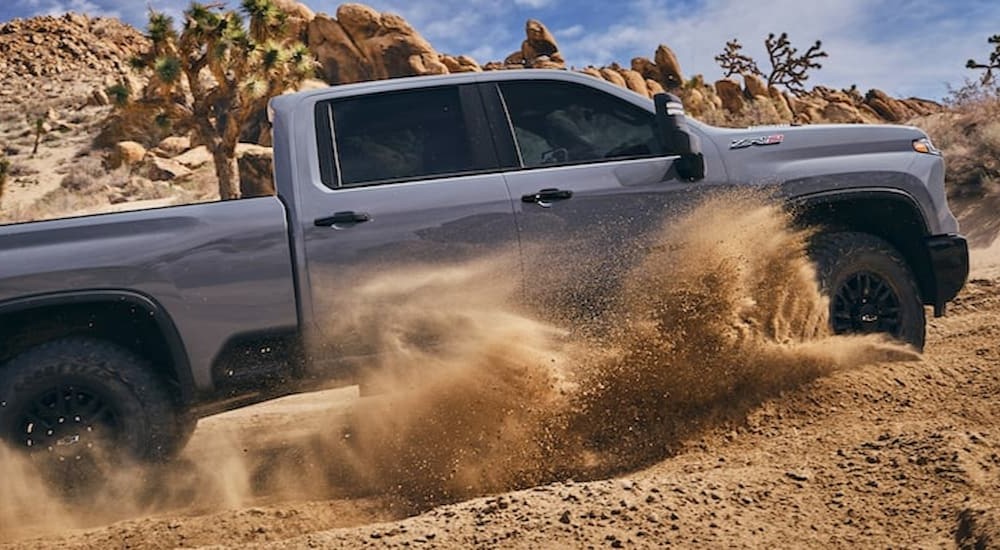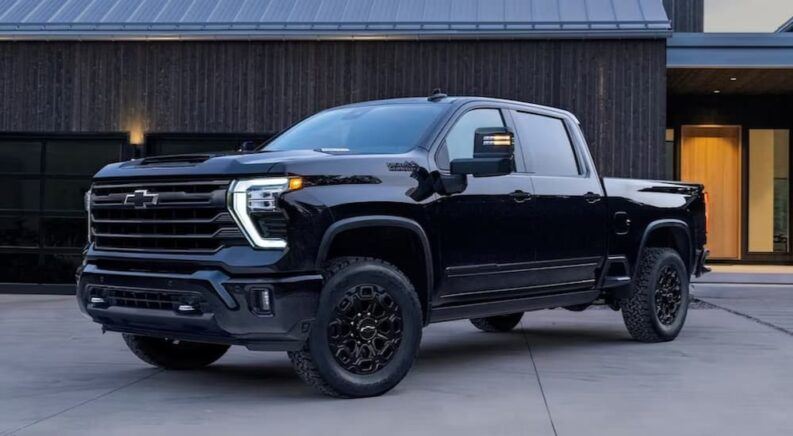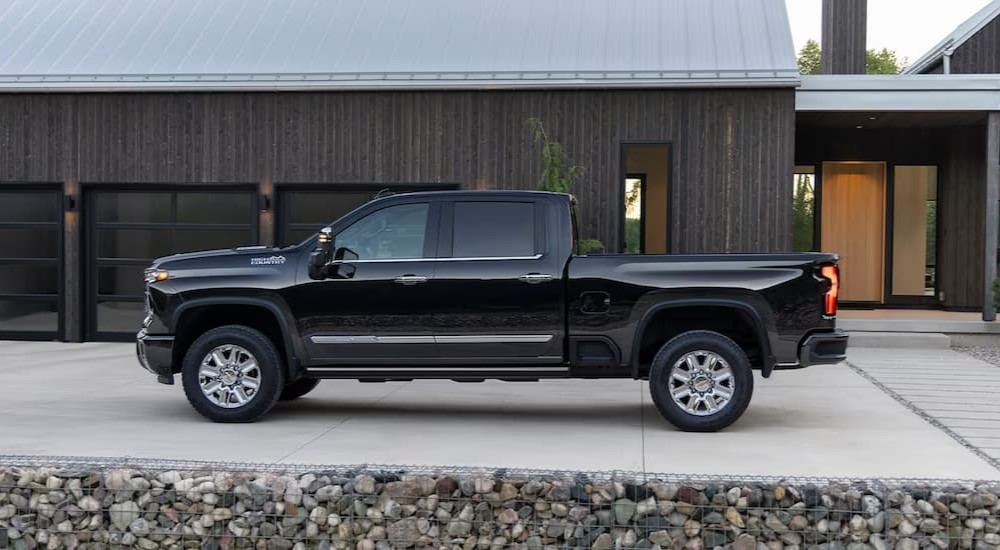When you think of a diesel engine, you might be imagining a large, lumbering semi rolling down the highway, letting off plenty of fumes. Or perhaps you’re not even thinking of automobiles at all, instead picturing a train roaring down the tracks using diesel fuel. What you might not be thinking of is the average sedan, SUV, or pickup truck, yet all of them are capable of offering a diesel engine. Heavy-duty pickup trucks are especially well-suited to diesel engines, which is something to keep in mind if you’re looking for a Chevy Silverado 2500 HD for sale or another similar truck.
Diesel engines are now far less polluting than in the past, and they’re much more fuel-efficient than gas engines. This is a helpful alternative if you want better fuel economy and to pay less at the pump but cannot find a hybrid or electric vehicle that works for you. If you’ve previously written off diesel as an option, you’re going to want to reconsider that: diesel has a fair bit to offer drivers.

What’s the Difference Between a Diesel Engine and a Gas Engine?
Aside from the difference in fuel types, diesel engines use compression ignition, while gas engines rely on a spark plug to ignite the fuel that pours in. To see how different the structure of each engine is, consider this: if a gas engine tried to use extreme compression, the fuel would detonate early and damage the engine. So, you are operating with two very different pieces of equipment.
There is plenty of good news for fans of diesel engines and anyone considering making the transition to a diesel engine. The diesel engine’s lack of a spark plug makes its setup simpler, requiring less maintenance than its competition. Thanks to fewer necessary repairs, diesel engines have a tendency to last longer than gas engines. The only downside is that it might take a little more effort to find a technician with diesel engine experience should your diesel engine require some serious work. In terms of design, however, a diesel engine has a clear advantage.
There are also environmental advantages to the diesel engine’s simplicity. Because it burns less fuel, it does not emit as much carbon dioxide as gas engines, meaning it’s better for the environment. For those who still picture the older diesel engines that coughed up fumes, this may come as a surprise. To any of you who’ve been using diesel engines, you’re probably already aware of their efficiency. You’re certainly aware of the increase in performance.
The Benefits of a Diesel Engine
Okay, so it has a better design: does that mean it’s better on the road? Usually, yes. Diesel engines give you more torque, so you’ll be able to take off faster. In other words, if you want to improve your zero to sixty stats, a diesel engine can be your best friend.
If you’re into towing, then diesel can really be your pal. I mentioned the Chevy Silverado 2500 HD before, so let’s stick with that as our example. Let’s say you’re on the market for one of these trucks because you know you’ll be doing some trailering. Maybe you plan to take a camper on vacation or haul heavy loads for work. You know you need all the towing power your truck can give you. Enter the diesel engine. The 2024 Silverado 2500 HD’s Duramax turbo-diesel provides up to 22,500 lbs of towing capacity compared to 18,700 lbs for the standard gasoline V8. You can tow a fleet of Silverados with that eye-popping limit.
It’s with pickup trucks that we can truly quantify just how much more powerful a diesel vehicle is compared to a gasoline model. But make no mistake: you’ll see an increase in performance with diesel engines in sedans and SUVs, too.
Diesel Downsides No More
It used to be that one downside to diesel was noise. That is no longer the case. You’ll have a nice quiet ride due to advancements in diesel engines, which no longer roar as you go down the road. In fact, modern turbo-diesel can often produce less noise than many gasoline engines.
You’ve probably seen that diesel costs more than gas and assume that’s a downside, too. Your eyes deceive you in this case. Yes, the cost of diesel is higher, but because the diesel engine is so much more efficient, you’ll end up using far less fuel and save money in the long run. This is especially true if you are someone who drives on the highway regularly. Highway efficiency is much higher than city efficiency, so you’ll soon see that the higher price of a diesel engine and the higher fuel cost will more than even out. If you’re towing on the highway, then the savings will really add up quickly. Financially, a diesel engine might save you thousands of dollars if you’re towing regularly.
Does This Mean Diesel Is Always Better?
No, not necessarily. In addition to the aforementioned issue with finding skilled diesel technicians, there are some drawbacks to diesel to consider. While diesel is much more efficient, a diesel engine will cost you more when you purchase or lease your vehicle. Over time, you’ll likely save a lot, but the initial payment will be higher, which can be financially inconvenient for many drivers.
The long-term savings often make diesel a better option but not always. One case in which you may not end up saving much money over the long run is if you only do city driving. While diesel is more efficient than gas for city driving, the difference between them is not as drastic in an urban environment, making it less likely you’ll see significant savings than if you live in a suburban or rural area.
If you’re someone who doesn’t do much driving in general, you also won’t see the savings match the initial expense. Diesel works well for those who drive a lot or do heavy towing with a truck like the Silverado 2500 HD. It’s not as economical for people who only drive a couple times a week––a proportion of the working population that has grown since working from home caught on during the pandemic. That still doesn’t make diesel a bad option, per se, as this type of driver may still enjoy the superior performance of a diesel, but the financial benefits are not there.
Is Diesel Right for Me?
If you do a lot of driving on the highway or suspect you’ll be using a truck for work, then diesel is an option to consider. There are the drawbacks I’ve mentioned, but for anyone who is regularly behind the wheel, a diesel engine should at least be in consideration when you next visit the dealership. Car manufacturers have made tremendous advances that will wipe away any preconceived notions about diesel that you have, and once you feel the extra kick it gives you on the road, you’ll never look back.
There’s a reason manufacturers like Chevy have begun pushing diesel options for their trucks. They’ve seen the results and know customers will be satisfied…and likely to come back for more. While not everyone will want to pick a diesel engine, the increased performance and efficiency, along with the trend of diesel options becoming more affordable, means that they are now ideal for a larger proportion of the market than in the past.






